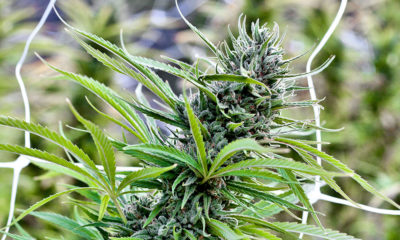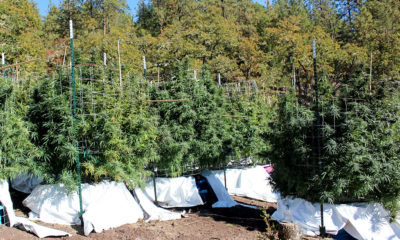
Cultivation
DEA to Approve More Marijuana Growers, Eventually
The DEA says it will open the doors to more cannabis research, but fails to provide a timeline.
The Drug Enforcement Administration has announced it is moving forward to facilitate the expansion of U.S.-based marijuana research. After a delay that lasted years, the DEA is now moving forward to allow U.S. cultivators to grow a larger amount of research-grade cannabis domestically, but it may take a while.
The DEA announced that it is providing notice to the pending applications that have amassed over the past two years since it originally put out the call for more marijuana growers and anticipate finding even more qualified candidates now that the ball is rolling. The agency also expects adding those additional growers will only further diversify the pool of research-grade marijuana, definitely a good thing.
In the press release on the announcement, the DEA notes that over the last two years the number of individuals registered with it to conduct research with marijuana in all its appropriate forms has jumped by more than 40%.
In January of 2017, there were 384 people in the U.S. approved to handle marijuana for research purposes. By January 2019 that number had jumped to 542. In light of the increase over the past two years, the DEA has doubled the production quota annually to keep pace.
“I am pleased that DEA is moving forward with its review of applications for those who seek to grow marijuana legally to support research,” said Attorney General William P. Barr. “The Department of Justice will continue to work with our colleagues at the Department of Health and Human Services and across the administration to improve research opportunities wherever we can.”
The Scottsdale Research Institute noted the timing of the announcement was in line with the Aug. 27 deadline to explain application delays to the DC Circuit Court
“The DEA has finally agreed to take the action everyone has been waiting for to facilitate research into medical uses of cannabis by ending 51-plus-year-old NIDA monopoly at University of Mississippi,” SRI Principal Investigator Dr. Sue Sisley said in an email.
Thanks to the legal action from SRI in June, all 33 of the pending applications to grow cannabis are being processed.
George Hodgin is another one of the applicants that has been waiting for years to hear today’s news. When he heard the DEA’s initial call for more cultivators, he founded Biopharmaceutical Research Company to eventually produce pharmaceutical-grade cannabis for federally-approved research purposes. The company has spent millions waiting to get growing and he was obviously thrilled at today’s news.
When trying to support his fellow veterans (Hodgin was a Navy SEAL officer in the Middle East and Asia) he discovered the current research barriers faced by those looking for a deeper scientific understanding of marijuana. He said when the DEA announced it would be moving away from the National Institute on Drug Abuse’s monopoly over cultivating research-grade marijuana he was ecstatic.
“We don’t violate federal law, we never have,” Hodgin told Cannabis Now in a phone interview following the DEA’s announcement. “We never participated in the state medical or recreational markets. We’ve been federally compliant since day one.”
Hodgin said his company was essentially in, and continue to be in, a holding pattern pending whatever action comes from today’s announcement. They’ve spent millions to build out their DEA compliant manufacturing facility and their team.
We asked Hodgin his hopes on the DEA’s timeline for the final regulations yet to be developed.
“I hope that it happens very quickly because we are ready and excited to work in those regulations to hopefully unlock treatments for vets and other suffering patients,” he said.
After years of waiting, DEA Acting Administrator Uttam Dhillon said the agency won’t only be approving new folks, but also expediting certain steps to make the process faster.
“[The] DEA is making progress in the program to register additional marijuana growers for federally authorized research, and will work with other relevant federal agencies to expedite the necessary next steps,” said Dhillon in the announcement. “We support additional research into marijuana and its components, and we believe registering more growers will result in researchers having access to a wider variety for study.”
Also in the announcement, the DEA noted certain forms of cannabis no longer require DEA registration to grow or manufacture thanks to the Agriculture Improvement Act of 2018. The bill changes the definition of marijuana to exclude hemp.
“Accordingly, hemp, including hemp plants and cannabidiol (CBD) preparations at or below the 0.3 percent delta-9 THC threshold, is not a controlled substance, and a DEA registration is not required to grow or research it,” the statement read.
Some are wondering how long the research approvals are going to take. One of the main factors of this concern is because the DEA plans on proposing a new set of regulations to govern the marijuana growers taking part in the program.
The DEA says new rules will help the agency evaluate the applications under the legal standard and conform the program to relevant laws.
“To ensure transparency and public participation, this process will provide applicants and the general public with an opportunity to comment on the regulations that should govern the program of growing marijuana for scientific and medical research,” the statement read. “And if we’ve learned anything over the last decade of cannabis reform these things tend to take a long time”
First, they will collect insight for the draft language from experts. They’ll write a draft and ask for public comment on that draft language. Then there will be a revised version and they will again ask for public comment. Then finally, who knows how many months from now, they will release a final language for comment and approval. But if people are still complaining by the time it gets to the proposed final language who knows what kind of timeline we might see.
We reached out to the nation’s oldest marijuana reform organization to weigh in on the day’s news.
“There is nothing in this new release that provides any sort of timetable as to when the agency intends to license these pending applications, some of which have been pending for well over two years,” NORML Executive Director Erik Altieri told Cannabis Now in an email.
“At this point, the DEA has had over three years to move forward with their initial promise to expand the number of licensed cultivators for marijuana research and the news today only reveals that in that time they have essentially achieved zero progress,” Altieri said. “This is the very definition of kicking the can further down the road since they have indicated none of this will move forward without the finalization of new regulations, which is essentially the same thing they told the public in 2016.”
TELL US, would you grow cannabis for government research?























